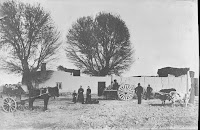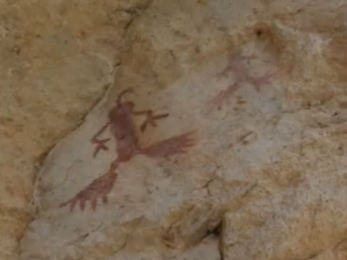 |
One of the pivotal episodes in Pilgrims on the Silk Road is the Mennonite sojourn in Lausan. When the Mennonites first arrived in Khiva, the khan granted them a piece of land along the Laudan canal near the Amu Darya river. The Mennonites called it “Lausan,” and built a settlement there. It was during this time that the last major schism in the group erupted. Half the group moved to the United States. Claas Epp’s faction moved to Ak Metchet to await the Second Coming. It was also during this period that a young Mennonite man was murdered by Turkoman bandits who were trying to abduct his wife.
A European busnessman and adventurer name Henri Moser traveled through the region during this period. The Mennonites formed a long acquaintence with Moser, and even explored going into business with him in Khiva. His first impressions of the Mennonites in Lausan are recorded in his 1885 book A Travers l’Asie Centrale: Le Steppe Khirghize, Le Turkestan Russe, Boukhara, Khiva, le Pays des Turcomans et la Perse. Here is the translation from the French:
Two men, speaking Russian, asked to see me. Their accent immediately betrayed their German nationality. It is impossible to describe the happiness of these impoverished people when I addressed them in their own language.
They were Mennonites who left Samara on the Volga. They were seeking a new homeland in which they could freely practice their religion without being liable for military service, which is contrary to their beliefs.Four hundred in number, they crossed the desert, at a cost of untold suffering, details of which await the hardest hearts. Finally, after many setbacks, they came to settle [near] Kipchak on the banks of the Amu. The Khan of Khiva granted them some territory in which they built miserable huts. The first wooden building they built was a church. Because they were not aware of how to use irrigation canals, their first harvests were poor, and they barely had enough to live. Yet, they were not discouraged. I admired their unshakable faith. They are, as the Huguenots once were, people whose trust in God to sustain them in all their trials.
Having learned of the arrival of Europeans in the capital, they sent the khan a deputation asking me to intercede on their behalf. “Come with us, they said, if our hospitality is humble, it will at least be cordial.“ Peaceful, since they never use weapons, they are constantly exposed to the depredations of the Turkomans, who remove their cattle. It is not uncommon to see these strong men, who could easily wipe out the thieves will simply follow them, begging them to restore their property, then when they go to the authorities, thieves have disappeared, and the matter rests there.
Taking a keen interest in those people who suffer for their faith, I told them the story of French emigrants after the revocation of the Edict of Nantes. They too started to live miserably in a foreign country. But thanks to their courage and trust in God, they have not been slow to prosper.
Will they succeed in these distant and barbarous lands? I wish them all my heart. If I could go to their urgent entreaties, at least I did my best to help them. When I left, I shook the hands of these honest people with pleasure, and they bade me farewell with their blessings.


